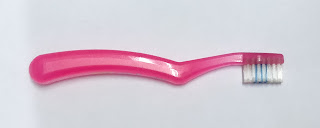Taking care of baby's teeth as soon as the first tooth erupts in the mouth is very important to prevent decay occurring in teeth later in life. There is a lot of confusion in parents regarding how to clean the teeth, which brush to use, and which paste to use. Read on to solve all your queries!
 1. When to start brushing?
1. When to start brushing?
Ideally you should start brushing even before the teeth have erupted, when the baby is 3-4 month old. Gently cleaning the gum pads and tongue with gauze wrapped around the finger helps in cleaning mouth. Massaging action with the gauze helps to soothe irritation on gums when teeth erupt. It also makes the baby accustomed to brushing.
2. Which brush to use?
After the teeth erupt you can start to use a finger brush as they are soft, gentle and sterilisable and gradually progress to baby tooth brushes once the baby is over an year old.
3. Which tooth paste to use?
Initially no toothpaste is required. Wet the brush with water and you are good to go. However, if you want to use a toothpaste, use a non-fluoridated one. That means it should not contain any amount of fluoride as babies don't know how to spit. Once, the baby learns how to spit (after 2-3 years of age), a pea sized amount of fluoridated toothpaste can be used for brushing.
4. How to brush?
You don't need to awkwardly hold the baby over the wash basin while brushing, since no spitting is required. Gently lay the child in your lap and clean the teeth. The baby may initially struggle and may not want his teeth to be brushed, but don't give up. Try to distract, be gentle yet firm. Initially babies struggle with everything. They don't want to be bathed, or to be clothed. Similar is with brushing. Slowly, the baby will get used to it.
5. How may times to brush?
Twice daily. Once, in the morning and then in the night just before sleeping.
Hope this help. Wish you best of health!
Healthy Smile Healthy You!
-Dr. Shruti Goel
Veda Dentistry and Cosmetology
www.vedadentistry.com
facebook.com/vedadentistry
9318481183
 1. When to start brushing?
1. When to start brushing?Ideally you should start brushing even before the teeth have erupted, when the baby is 3-4 month old. Gently cleaning the gum pads and tongue with gauze wrapped around the finger helps in cleaning mouth. Massaging action with the gauze helps to soothe irritation on gums when teeth erupt. It also makes the baby accustomed to brushing.
2. Which brush to use?
After the teeth erupt you can start to use a finger brush as they are soft, gentle and sterilisable and gradually progress to baby tooth brushes once the baby is over an year old.
3. Which tooth paste to use?
Initially no toothpaste is required. Wet the brush with water and you are good to go. However, if you want to use a toothpaste, use a non-fluoridated one. That means it should not contain any amount of fluoride as babies don't know how to spit. Once, the baby learns how to spit (after 2-3 years of age), a pea sized amount of fluoridated toothpaste can be used for brushing.
4. How to brush?
You don't need to awkwardly hold the baby over the wash basin while brushing, since no spitting is required. Gently lay the child in your lap and clean the teeth. The baby may initially struggle and may not want his teeth to be brushed, but don't give up. Try to distract, be gentle yet firm. Initially babies struggle with everything. They don't want to be bathed, or to be clothed. Similar is with brushing. Slowly, the baby will get used to it.
5. How may times to brush?
Twice daily. Once, in the morning and then in the night just before sleeping.
Hope this help. Wish you best of health!
Healthy Smile Healthy You!
-Dr. Shruti Goel
Veda Dentistry and Cosmetology
www.vedadentistry.com
facebook.com/vedadentistry
9318481183




Very well written !thank you for the information
ReplyDeleteThank You Dr. Dhruti! Your support is appreciated :)
DeleteWow Dr. Shruti. So simple and to the point. Perfectly answers all queries of a new mother . 👍
ReplyDeleteThank You :)
DeleteVery useful information...much needed for parents of young kids
ReplyDeleteThank you Dr Shruti
Thank you Anshul :)
DeleteWell explained, eye opener and authentic information for young mothers.
ReplyDeleteThanks Dr Shruti .
Looking forward for more posts
Thank you for encouragement!
DeleteNice blog ... Thanks for solving all queries in one I can start with my daughter ...
ReplyDeleteThanks mansi. I am glad this info is useful for you :)
DeleteA Great read for the New Moms.
ReplyDeleteEasy & Informative
Thanks Aditi :)
DeleteVery well written information for the new moms, yet to become moms and for grandparents also who off and on do take care of their grandchildren.............
ReplyDeleteThank you :)
Delete